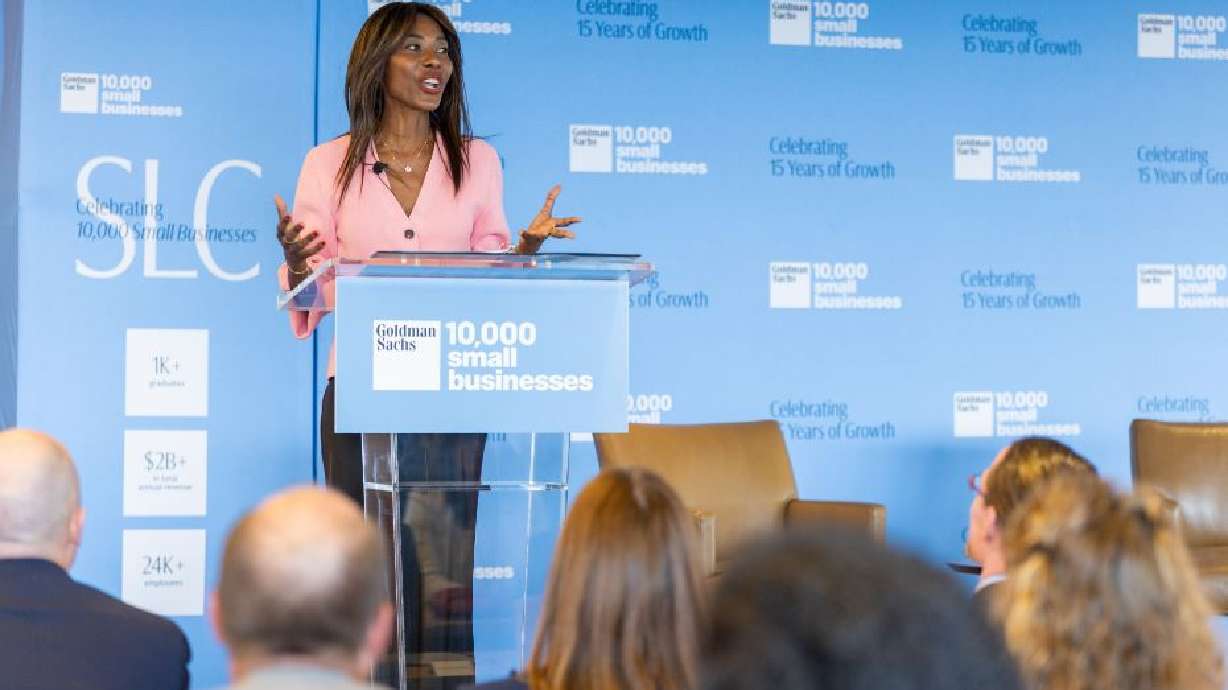Estimated read time: 4-5 minutes
- Goldman Sachs launched its $100-million program for rural small businesses in Utah on Thursday.
- The initiative is an extension of its 10,000 Small Businesses program for rural communities.
- Utah's first cohort begins in October, aiming to enhance education and resources for entrepreneurs.
SALT LAKE CITY — Goldman Sachs announced applications are open in Utah for its $100-million investment initiative to provide education and loans to small businesses in rural communities.
The initiative is an extension of the global investment firm's 10,000 Small Businesses program, which aims to provide education, capital and support services to small-business owners through a 12-week curriculum. After seeing the success the program had in urban areas, Goldman Sachs committed $100 million in 2023 to expand the program to rural communities in 20 states in the next five years.
Applications for the program are open through July 16 and can be found online. Utah's first program cohort will begin in October.
"Businesses outside of the metro Salt Lake area ... can now all access this best-in-class educational program, access to capital and an all-important peer network," said Asahi Pompey, global head of Corporate Engagement at Goldman Sachs. "Why are we doing this? Because Goldman Sachs is bullish. We're bullish on the economic power and potential of Utah."
Utah is now the 11th state to be included in the rural communities investment. According to Goldman Sachs, 86% of small businesses in rural communities plan to grow, but less than 10% believe they have the needed resources. The $100 million investment includes $75 million for small business loans.
Goldman Sachs' 10,000 Small Businesses program has produced 16,600 graduates nationwide in its 15-year career, far surpassing its original goal. Salt Lake City's small businesses program celebrated the graduation of its 1,000th small business on Thursday at a graduation ceremony for its 35th cohort, made up of nearly 30 business owners. According to Pompey, the cohort has provided 24,000 jobs to Utahns and made $2 billion in revenue.
"(10,000 Small Businesses) believe in me before I believed in myself," said Shannon Baird, a graduate of the cohort and owner of SHANNON, a custom ring business. "We were all going through the same challenges. I realized that I had been (an) entrepreneur all along, and this program gave me the knowledge, resources and community to do it better. ... No one can build a business completely on their own. This program and this community ensures that none of us (have) to."
Gov. Spencer Cox attended the graduation event, which also commemorated 25 years of Goldman Sachs being in Utah, and joined Pompey in a discussion about the importance of small businesses.
"It's hard to start a business on the Wasatch Front; it's even harder to start a business in a rural area," said Cox. "So this news to me is a dream come true. I love this program, I believe in it so much, and my only lament was always that it wasn't available to everyone, and now it is."
Cox discussed the challenges facing small businesses in rural communities, which he described as a simple lack of education and access to education. He also highlighted how Utah remains a national leader in gross domestic product, entrepreneurship and economic outlook, citing the state's history of collectivism over individualism dating back to the pioneers.
"(We're used to the) rugged individualism of the West ... but Utah is different than Arizona or New Mexico or other places, because it's not rugged individualism. It's rugged communities," said Cox. "People who have come here since, all of us together, realize that we need each other to be successful. ... When I say we're No. 1 in volunteerism and No. 1 in charitable giving, I actually think that's why we're No. 1 in business."
The success of the 10,000 Small Businesses program in Salt Lake City has reflected the state's overall success in business, according to Pompey.
"What we've seen in Utah has been really incredible with our 1,000 graduates. They are growing their business faster than other demographics. They're creating more jobs for families and communities in the state," she said. "So we like to say yes, it's about the small business, but it's about that network beyond the small business, the impact on families and communities, more broadly."
Looking forward, Goldman Sachs' 10,000 Small Businesses is working toward graduating 20,000 entrepreneurs from the program. For more information on the 10,000 Small Businesses program, visit the Goldman Sachs website.








